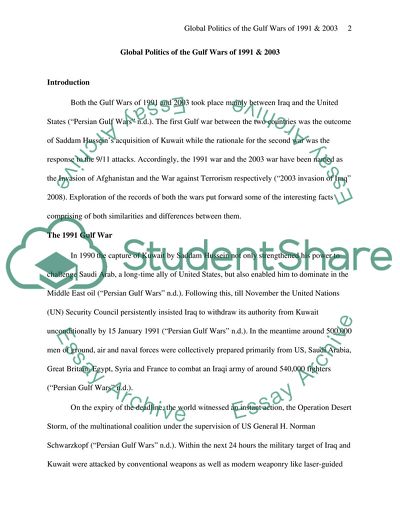Cite this document
(Global Politics of the Gulf Wars of 1991 and 2003 Term Paper, n.d.)
Global Politics of the Gulf Wars of 1991 and 2003 Term Paper. Retrieved from https://studentshare.org/politics/1712914-compare-and-contrast-the-global-politics-of-the-gulf-wars-of-1991-and-2003-and-their-outcomes-subject-contemporary-issues-in-global-politics-the-twenty-firs
Global Politics of the Gulf Wars of 1991 and 2003 Term Paper. Retrieved from https://studentshare.org/politics/1712914-compare-and-contrast-the-global-politics-of-the-gulf-wars-of-1991-and-2003-and-their-outcomes-subject-contemporary-issues-in-global-politics-the-twenty-firs
(Global Politics of the Gulf Wars of 1991 and 2003 Term Paper)
Global Politics of the Gulf Wars of 1991 and 2003 Term Paper. https://studentshare.org/politics/1712914-compare-and-contrast-the-global-politics-of-the-gulf-wars-of-1991-and-2003-and-their-outcomes-subject-contemporary-issues-in-global-politics-the-twenty-firs.
Global Politics of the Gulf Wars of 1991 and 2003 Term Paper. https://studentshare.org/politics/1712914-compare-and-contrast-the-global-politics-of-the-gulf-wars-of-1991-and-2003-and-their-outcomes-subject-contemporary-issues-in-global-politics-the-twenty-firs.
“Global Politics of the Gulf Wars of 1991 and 2003 Term Paper”. https://studentshare.org/politics/1712914-compare-and-contrast-the-global-politics-of-the-gulf-wars-of-1991-and-2003-and-their-outcomes-subject-contemporary-issues-in-global-politics-the-twenty-firs.


